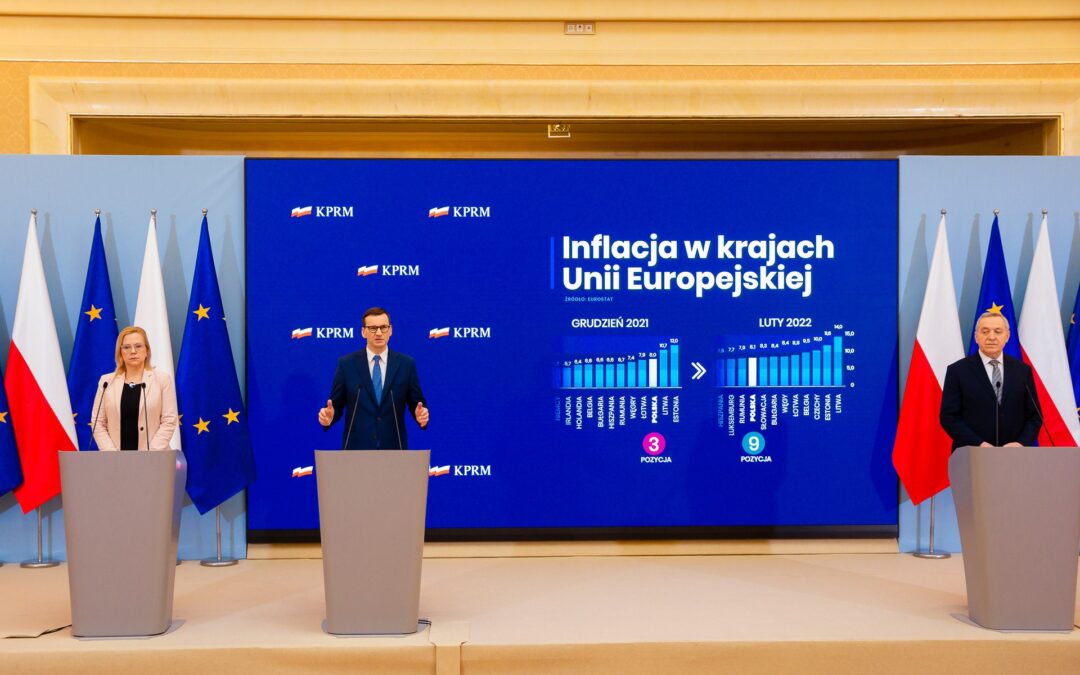Poland’s government has announced plans to “de-Russify” its economy and combat inflation through a set of policies it has labelled an “anti-Putin shield”. The first part of the package, unveiled today, aims to bring down high food prices, give additional payments to pensioners, and further invest in energy independence.
The war in Ukraine is causing “enormous economic turbulence, enormous problems”, Prime Minister Mateusz Morawiecki said at a press conference today. “But we want to come out stronger, we want to come out more resistant”.
“We will carry out the de-Russification of the Polish economy,” declared Morawiecki. “The government has decided to implement an anti-Putin shield.”
🛡 Pierwsza część Tarczy Antyputinowskiej to:
🌽 Zapobieganie wzrostowi cen żywności przez wsparcie dla rolników w zakupie nawozów ⤵Więcej na ▶️ https://t.co/ofmRNZVRgI pic.twitter.com/MqPegyna4N
— Kancelaria Premiera (@PremierRP) March 18, 2022
Part of these efforts will be counteracting inflation and its effects, said the prime minister. Before the current crisis, Poland already had the EU’s joint-highest level of inflation last year and was forecast to have the highest again in 2022. Inflation forecasts have increased even further since Russia’s invasion.
The first tranche of measures under the government’s new “shield” will focus on bringing down high food prices by supporting farmers and softening the effects of inflation by providing bonus payments to old-age and disability pensions, who make up a quarter of the population.
“We must act at the source, where farmers are bearing the highest costs,” Morawiecki said, quoted by RMF24. “That is why fertilisers, as one of the components of the process of producing food, will be the first element of the anti-Putin shield.”
Farmers have been feeling the effects of Putin’s policies for “many, many months”, Morawiecki added. They will therefore receive a subsidy of up to 500 zloty (€105) per hectare up to 50 hectares (123.5 acres) as well as 250 zloty for meadows and pastures, also up to 50 hectares.
Those figures are the maximum amounts that can be paid out, Henryk Kowalczyk, the agriculture minister, then clarified, reports Business Insider Polska.
The prime minister also said that “in a few weeks” almost 10 million people would receive a bonus “13th” pension payment. This will “alleviate, at least to some extent, the effects of this war in Ukraine…[and] will ease issues related to inflation”, he explained.
Morawiecki also stressed the importance of continuing Poland’s moves towards energy independence, announcing that 3 billion zloty would be allocated to recapitalising the Gaz-System company, which is constructing gas pipelines.
“Vladimir Putin has completely abandoned the normal rules,” he said. “Gas blackmail, using energy resources as an element of war…these are actions we must combat on many fronts.”
Morawiecki also mentioned plans to expand the liquified natural gas (LNG) terminal in Świnoujście and build a new floating storage and regasification unit (FSRU) in Gdańsk.
“This is our new infrastructure which will lead to a reduction in prices, because by preventing the possibility of Putin’s blackmail, de facto we will introduce lower gas prices,” said the prime minister, who also pointed to the Baltic Pipe, a near-complete project to bring Norwegian gas to Poland via Denmark.
“This will all help in the de-Russification of the Polish and EU economy,” Morawiecki said, quoted by Business Insider. “All this will cost money, but that is the price of Europe’s being or not being.”
Main image credit: Kancelaria Prezesa Rady Ministrów/Gov.pl (under CC BY 3.0 PL)

Ben Koschalka is a translator, lecturer, and senior editor at Notes from Poland. Originally from Britain, he has lived in Kraków since 2005.




















